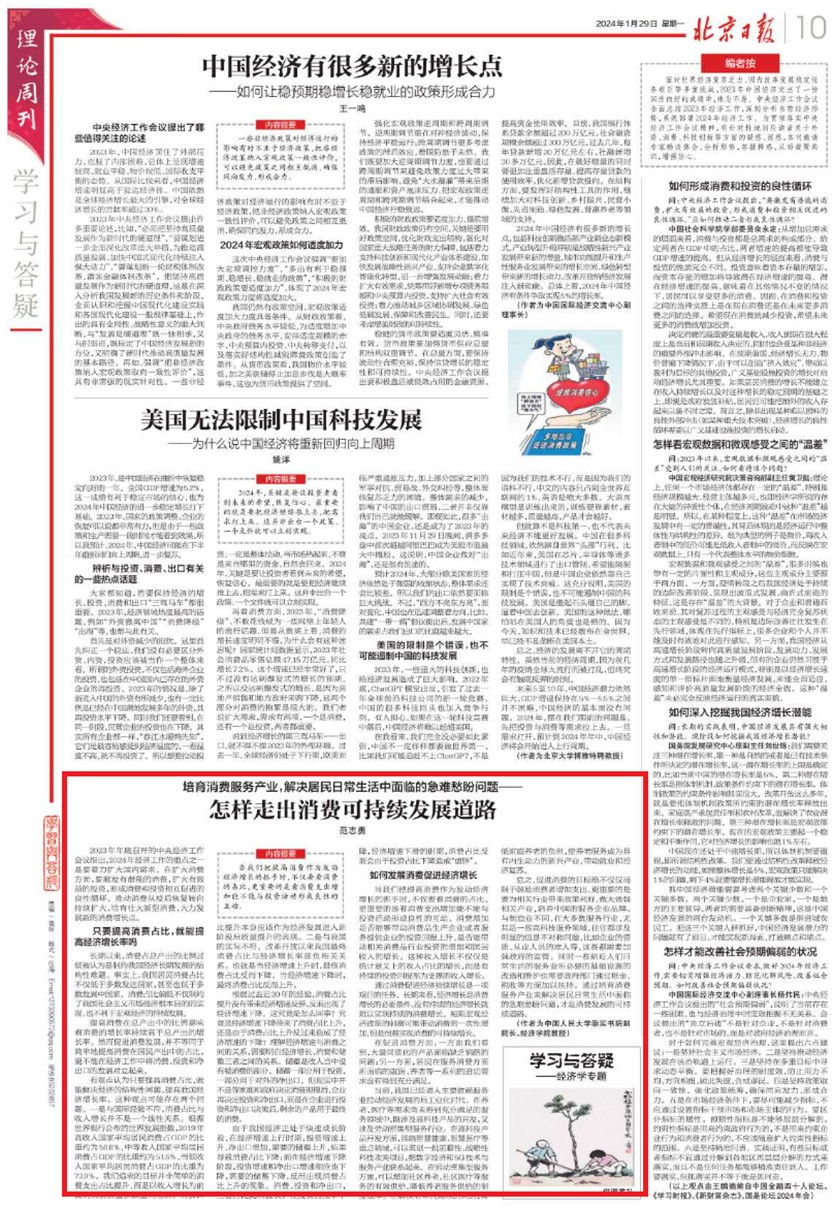21
Feb
When we take expanding consumption as the starting point for igniting economic growth, we must not only look at the proportion of consumption, but more importantly, whether the increase in consumer spending can form a positive interaction with investment activities.
China’s annual Central Economic Work Conference (CEWC) held at the end of 2023 conveyed a clear message that one of the economic priorities in 2024 is to boost domestic demand. In terms of expanding consumption, it is necessary to clarify that efforts should be made to stimulate consumption while also expanding investment to create a virtuous cycle of mutual support. Guiding the economy growth from the post-pandemic recovery, government will cultivate and focus on developing new areas of consumption.
For a long time, the low proportion of consumption in total output has been considered a structural problem that restricts the long-term development of China's economy. In fact, the proportion of China's residents' consumption is not only lower than that of most developed countries, but also lower than that of most developing countries. The low proportion of consumption not only restricts the realization of the fundamental purpose of socialist market economy, but is also detrimental to the sustainable development of the macro economy.
Increasing the proportion of consumption in total output means that the growth rate of consumption continues to be higher than the growth rate of total output. However, promoting the development of consumption is not the same as simply increasing the proportion of consumption in national total output, but let alone the development of consumption, investment and net exports.
When we take increasing consumption as the starting point for igniting economic growth, we must not only look at the proportion of consumption, but more importantly, whether the increase in consumer spending can form a positive interaction with investment activities. Whether increased consumption can lead to an increase in the investment returns of consumer goods, manufacturing companies or service providing companies, and whether it can drive an increase in investment in related consumer goods industries and an increase in national income. This kind of revenue growth is not just a growth in revenue proportion in a statistical sense, but a revenue growth supported by a sustained return on investment.
Promoting sustained economic growth through consumption is an arduous task. In the long run, economic growth is a necessary condition for consumption growth. Without sustained economic growth, it is difficult to achieve sustained consumption growth. The stimulation of short-term macroeconomic policies may lead to a one-time increase in consumption, but it is difficult to achieve sustainable growth in consumption.
In terms of expanding consumption, on the one hand, we see that a large number of homogeneous products face the problem of sales. On the other hand, a series of urgent needs faced by residents in terms of service consumption, such as medical treatment and elderly care, have not been fully met.
At present, China has entered a post-industrial era that mainly relies on the service industry to drive economic development. In service fields such as elderly care and medical care where the needs have not yet been fully met, it involves both the development of high-tech products and labor-intensive service industries. In terms of high-tech product development, focusing on key areas such as smart health and smart medical care, a number of cutting-edge and strategic scientific and technological research projects can be planned to connect the digital economy and 5G technology with the service industry. In terms of labor-intensive services, we can increase the effective supply of community elderly care, community medical care and other services, and reduce the institutional cost of providing elderly care services. While addressing the needs of the elderly, it also reduces the burden of family care, making elderly care services an emerging industry with endogenous power and driving employment and economic recovery.
In short, the goal of expanding consumption is by no means limited to encouraging consumers to increase spending. It is more important to bring policy benefits to related industries, making related industries bigger and stronger, and cultivating Chinese service brands. Unlike the manufacturing industry, most service industries, especially some high-tech services, often involve obvious information asymmetry issues, such as the qualifications of enterprises and the access of employees, etc., which require strengthened government supervision. At the same time, the transformation and maintenance of some infrastructure necessary for service industries that are close to people's daily lives also require support from government through rents, taxes, etc. Cultivating consumer service industries to solve the urgent, difficult and anxious problems faced by residents in their daily lives is the sustainable path for consumption development.